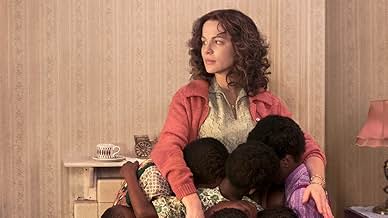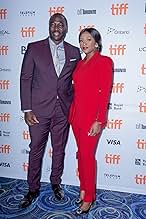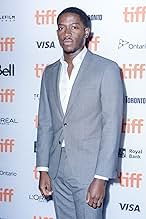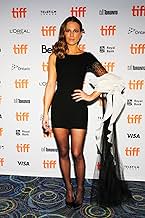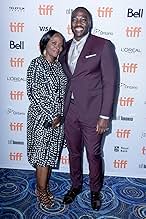IMDb रेटिंग
6.2/10
2.5 हज़ार
आपकी रेटिंग
अपनी भाषा में प्लॉट जोड़ेंBased on the writer/director's childhood, FARMING tells story of a young Nigerian boy, 'farmed out' by his parents to a white British family in the hope of a better future. Instead, he joins... सभी पढ़ेंBased on the writer/director's childhood, FARMING tells story of a young Nigerian boy, 'farmed out' by his parents to a white British family in the hope of a better future. Instead, he joins a white skinhead gang.Based on the writer/director's childhood, FARMING tells story of a young Nigerian boy, 'farmed out' by his parents to a white British family in the hope of a better future. Instead, he joins a white skinhead gang.
- निर्देशक
- लेखक
- स्टार
- पुरस्कार
- 3 जीत और कुल 3 नामांकन
फ़ीचर्ड समीक्षाएं
Being the directing and/or screenwriting debut of a well-known actor always loads a movie with a lot of baggage and expectations, for every critical darling like "Good Will Hunting" and "Gone Baby Gone" you get a forgettable "In the Land of Blood and Honey" or "Déficit". The baggage only gets heavier when it also happens to be openly based on the actor's own life story. The last such case of this double-duty debut I can think of lead to the multi-award winning and nominated "Lady Bird" by Greta Gerwig, so... no pressure.
"Farming" is British actor Adewale Akinnuoye-Agbaje's telling of his own life story having been "farmed out" as a baby in the late 1960s to a couple in Tilbury. This was a common practice with African, mostly Nigerian, couples in the UK, where they would hire white, British foster parents to care for their children in the hope that it would lead to better lives for them. Many of these white families were working-class, not indifferent to the pay involved in fostering and unprepared for the unique challenges that the race relations of the practice could lead to. Adewale's film avatar Enitan is also farmed out, taken back for a few years by his biological parents to their native Nigeria, has constant identity crises after his return to England and these result in him joining a white supremacist skinhead gang.
As a testament to its staying cultural impact, Dave Chappelle's "Black Klansman" character is probably the first thing that comes to mind when picturing a black person joining a white supremacist group, but the situation is not even remotely played for laughs here. For the most part, "Farming" is brutal, Enitan's crisis and isolation, strong enough to make him want to join any group that'll take him even if it's just to hate on him, is greatly portrayed in all its troubling phases by Damson Idris (the actor playing him as a child, along with the rest of the child performers are unfortunately a lot less successful). Damson is not alone in carrying the movie, his strongest peer being an electrifying John Dagleish, playing the skinhead gang's leader with such power that one could understand Eni's wish to follow him, even through the obvious hate. Keeping the film from becoming monotonously bleak is an incredibly stylish production design (even if some locations are clearly too modern for their time setting) and the occasional gorgeous, almost classic, grainy stock, high-contrast photography coupled with a great selection of songs related to the Black British experience.
Among the rest of the cast, Kate Beckinsale is to be noted as she's never before been seen playing a character like this toxic-yet-watchable mother, and she does it well, it's just a shame that the character itself is almost a stock one in modern drama thanks to "Tonya", "The Fighter" and the already-mentioned "Lady Bird". AAA playing the avatar of his own father is interesting too, for the role this might have in his own process of dealing with the events depicted.
For all its audiovisual strengths the movie unfortunately falls short on the story department specially near the end. In an attempt to make the previous brutality end in less of a downer note, the final minutes try to wrap everything up a tad too nicely. This along with some unsure pacing decisions denote the nature of this movie as an opera prima, fortunately not to the extent of detracting from the end result though. Finally, considering the U.S.'s role as the leading cultural force in the world, where most of the art related to the race relations of black people originates from, it is refreshing to see a different aspect of these as they happen in other countries, specially when they're told so vividly by creatives who've lived through and been inspired by them.
"Farming" is British actor Adewale Akinnuoye-Agbaje's telling of his own life story having been "farmed out" as a baby in the late 1960s to a couple in Tilbury. This was a common practice with African, mostly Nigerian, couples in the UK, where they would hire white, British foster parents to care for their children in the hope that it would lead to better lives for them. Many of these white families were working-class, not indifferent to the pay involved in fostering and unprepared for the unique challenges that the race relations of the practice could lead to. Adewale's film avatar Enitan is also farmed out, taken back for a few years by his biological parents to their native Nigeria, has constant identity crises after his return to England and these result in him joining a white supremacist skinhead gang.
As a testament to its staying cultural impact, Dave Chappelle's "Black Klansman" character is probably the first thing that comes to mind when picturing a black person joining a white supremacist group, but the situation is not even remotely played for laughs here. For the most part, "Farming" is brutal, Enitan's crisis and isolation, strong enough to make him want to join any group that'll take him even if it's just to hate on him, is greatly portrayed in all its troubling phases by Damson Idris (the actor playing him as a child, along with the rest of the child performers are unfortunately a lot less successful). Damson is not alone in carrying the movie, his strongest peer being an electrifying John Dagleish, playing the skinhead gang's leader with such power that one could understand Eni's wish to follow him, even through the obvious hate. Keeping the film from becoming monotonously bleak is an incredibly stylish production design (even if some locations are clearly too modern for their time setting) and the occasional gorgeous, almost classic, grainy stock, high-contrast photography coupled with a great selection of songs related to the Black British experience.
Among the rest of the cast, Kate Beckinsale is to be noted as she's never before been seen playing a character like this toxic-yet-watchable mother, and she does it well, it's just a shame that the character itself is almost a stock one in modern drama thanks to "Tonya", "The Fighter" and the already-mentioned "Lady Bird". AAA playing the avatar of his own father is interesting too, for the role this might have in his own process of dealing with the events depicted.
For all its audiovisual strengths the movie unfortunately falls short on the story department specially near the end. In an attempt to make the previous brutality end in less of a downer note, the final minutes try to wrap everything up a tad too nicely. This along with some unsure pacing decisions denote the nature of this movie as an opera prima, fortunately not to the extent of detracting from the end result though. Finally, considering the U.S.'s role as the leading cultural force in the world, where most of the art related to the race relations of black people originates from, it is refreshing to see a different aspect of these as they happen in other countries, specially when they're told so vividly by creatives who've lived through and been inspired by them.
In the early 1990s while dinning in an African restaurant in Los Angeles, I bumped into Adewale - he'd heard my English accent as I spoke with my West African wife and struck up a conversation. We exchanged numbers and agreed to meet up again having mentioned our mutual interest in the movie industry. He was just breaking into Hollywood and I fancied myself a screenwriter.
Adewale shared the phenomenon of 'farming the children,' recounting his own experiences under that abdication of parental responsibility. Since we're both Londoners of similar age we shared stories of our youth in the late seventies. I spent that period of my life deeply immersed in the British punk rock scene, itself a hub for the skinhead and mod revivals. I have no recollection of Adewale mentioning his peculiar involvement in a gang of ultra-violent white racist skinheads during this era; perhaps shame dictated he avoid speaking of such an astonishing episode in his life.What I do know is that his movie's portrayal of nineteen-seventies white working-class English people and of the subcultures of their children is absurdly cartoonish and trite.
The neo-Nazi, psycho-skin trope has been a reliable contemporary Hammer Horror-like monster which 'Farmed' disappointingly enjoins. It's unfortunate since this era's youth is redolent with story lines worth telling - and worth telling accurately. The working-class English who lived during that time are a kaleidoscope of characters and attitudes worthy of honest examination as are their interactions with immigrants and their English-born children. To portray them as generally bigoted, oafish, humourless and hyper-aggressive is to indulge a stereotype no less insulting than the black pimp or the inscrutable Asian.
Nigerian farmed children have unique and lamentable stories, but for me this film failed to capture the emotional complexity and profundity of the arrangement due to heavy-handed poetic license of the writer/director.
Wally Badger, aka Adewale Akinnuoye-Agbaje, is misleading his intended audience with a view to making a profit. Unbeknown to him, because he failed to do proper research, the Skinhead gang he claims to of belonged to, have been written about many times online and in print. The BBC even recorded a documentary detailing some of their activities. The evidence that suggests his story is pure fantasy, will be damaging to him to say the least.
I was not aware of the "farming" practice... But i'm "happy" - kind of - to have discovered it with this movie. The only fact that it is based on the writer's life made it so strong and so, deep! I recommend this movie to anyone interested into this topic - or anyone who enjoy great movies! There is some images that really hit at the right place... Damson Idris is really something... His role must have been hard to do but he nailed it like... NAILED IT!... And what to say about Kate Beckinsale, simply stunning!!! Seriously, are you still reading ?.... Go watch this movie, and hit like NOW!
For what this is, the film deserves a top score. This is a very subjective opinion from a fellow farmee - it is astonishing there is still so little information available on the project between the 1960 - 1990 & how specifically Nigerians were affected. I'm sure there are plenty that would like to know more about their experiences but will struggle to find much. The film paints a perfect picture of the time & articulates the challenge of identity with aplomb.
क्या आपको पता है
- ट्रिवियाShortly after the release of this film, the online blog 'Creases Like Knives' published an article and review of the film, heavily implying that writer/director Adewale Akinnuoye-Agbaje had fictionalized a great deal of what was supposed to be 'his' story. The 'Tilbury Skins' gang portrayed in this film were inaccurately depicted, and anybody from Akinnuoye-Agbaje's past has yet to come forward and confirm that he was in fact a member of the white skinhead gang (let alone being their leader). On the contrary, a few people who attended high school with Akinnuoye-Agbaje describe him as belonging more to the 'mod' crowd, who never associated with such gangs.
- गूफ़Ms. Dapo's phone number is eleven digits long and begins with 013. In the 1980s UK phone numbers were ten digits long and the only ones which began with 01 were London's which had the dialing code 010.
टॉप पसंद
रेटिंग देने के लिए साइन-इन करें और वैयक्तिकृत सुझावों के लिए वॉचलिस्ट करें
- How long is Farming?Alexa द्वारा संचालित
विवरण
- रिलीज़ की तारीख़
- कंट्री ऑफ़ ओरिजिन
- आधिकारिक साइट
- भाषा
- इस रूप में भी जाना जाता है
- Воспитание
- फ़िल्माने की जगहें
- Gillingham, केंट, इंग्लैंड, यूनाइटेड किंगडम(jewellery shop)
- उत्पादन कंपनियां
- IMDbPro पर और कंपनी क्रेडिट देखें
बॉक्स ऑफ़िस
- दुनिया भर में सकल
- $89,374
- चलने की अवधि1 घंटा 41 मिनट
- रंग
- पक्ष अनुपात
- 2.35 : 1
इस पेज में योगदान दें
किसी बदलाव का सुझाव दें या अनुपलब्ध कॉन्टेंट जोड़ें




